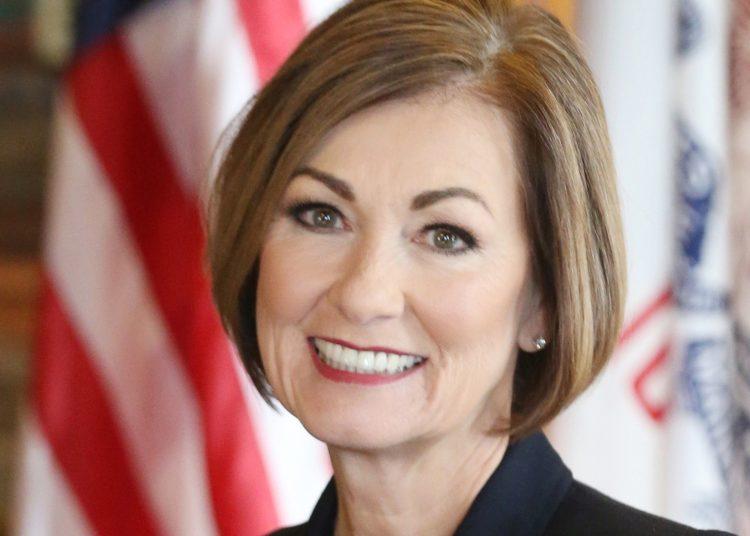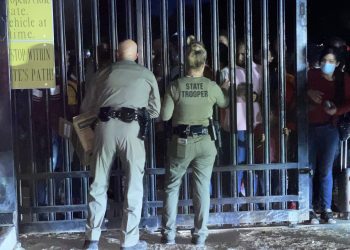DES MOINES, Iowa – Gov. Kim Reynolds discussed her plan to give parents more choice in their child’s education by awarding Students First Scholarships to eligible low and middle-income families during a press conference at Saint Theresa Catholic School in Des Moines.
The Governor’s bill, SSB 3080 in the Iowa Senate and HSB 672 in the Iowa House, proposes that a portion of per pupil funding would follow eligible students who withdraw from public school to help cover qualifying expenses such as tuition and fees at the school of their choice. Students who are currently enrolled in a public school or will be starting Kindergarten are eligible for the scholarship if their household income is 400 percent of the federal level or if the student has an individualized educational plan (IEP). The criteria allows children from families of all backgrounds and income levels to attend the school that best meets their needs.
“There are high-quality public schools across Iowa that are meeting the needs of the students and families they serve, but some parents believe their children would do best in a different learning environment,” state Gov. Reynolds. “In many cases, those options belong exclusively to those who can afford them. I believe more families deserve a choice, which is why I’ve introduced a bill that empowers low and middle-income parents and raises the bar for all schools.”
If a student chooses to leave a public school, 70 percent of the per pupil funding, which amounts to $5,359, would be deposited into an education savings account (ESA). The remaining 30 percent would be allocated by the state to smaller, often rural public school districts. This is in addition to the public school funding generated by local and federal taxes, which would remain with the original public school, despite the school no longer having responsibility for the scholarship student’s education.
“It means everything to me to have the opportunity to choose,” Jessica Cashman, a parent of a preschooler at St. Theresa’s, said. “Also, as a taxpayer, a homeowner, a full time employee, and my priority of being a mother, I want to set the foundation of success for her future. It is very dear to my heart, as you can see, but not only for Evelyn but the opportunity to others, mothers like me, families like me, that work very hard and deserve a chance to choose.”
Charlotte James, a junior at Dowling Catholic High School in West Des Moines, also spoke in support of school choice.
“Dowling Catholic has changed my life in the best way possible. I’ve learned leadership skills, the ability to work with adults, I learned how to academically push myself and when I need a helping hand to ask for some assistance. I’ve been able to speak on my beliefs and opinions as well as learn more about them. I would not be the person I am today without attending,” she said.
“When I speak to my friends outside of school, they often wish for the opportunities that I’ve been given. Not all families in Iowa are able to make the choice of where their children will attend school. By offering these scholarships to students, there’s more of an opportunity for those who want to push themselves and succeed. We will also be able to make our private schools more diverse and unify our community by making school choice an option for more families,” James added.
The legislation also requires public schools to post course syllabuses, materials and library books online. A review process for any questionable materials in libraries already exists, but this bill provides more transparency of the review process and adds a 30-day timeline with the ability to appeal the decision to the state’s Board of Educational Examiners.
Also included in the Governor’s bill is a requirement that all high school students pass the Civics portion of the U.S. Naturalization Service Test to be able to graduate high school. The bill also eliminates the requirement for PK-12 librarians to have a Master’s degree and eliminates the need for AEA approval to place students receiving special education services in private instruction.
Education is the single largest line item on the state’s balance sheet, accounting for more than 56 percent of the entire state budget. Since fiscal year 2012, Republican leaders have increased school funding every year for a total increase of $1.12 billion. Since fiscal year 2018, Iowa’s total public education budget has increased by nearly $500 million. Critics have pointed out that the funding increases are not keeping up with inflation.
Reynolds was asked about the status of the bill as it appears stalled. The Iowa Senate version of the bill passed out of subcommittee, but has not yet been debated in the Iowa Senate Education Committee. The Iowa House version has not yet had a subcommittee hearing.
“I feel confident in that so we can keep the discussion going. We’ve made a lot of consensus and compromises within the bill that I put forward this year. But today, we’re going to continue to work with legislators and listen and do what we can to get it across the finish line,” she said.
















